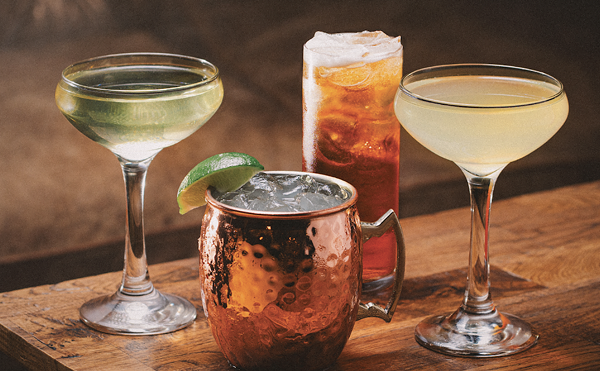|
Extreme adventure might be his diet, but for former Cincinnati chef Bruce French extreme service is his nourishment. For six months a year, French — a local legend in the Cincinnati restaurant scene in the 1980s and '90s — works as a private chef for touring Rock bands such as Bruce Springsteen, Red Hot Chili Peppers, Rush, Stone Temple Pilots, U2 and Pearl Jam. For the past 10 years the lifestyle has afforded him travel time to such exotic places such as Djibouti, Sudan, Crete, Malta and Sri Lanka, where he spent a month in the coastal tourist city of Galle several years back.
Since January, French has been on the island of Sri Lanka once again, a dozen miles north of Galle, in the ravaged village of Peraliya. This time, however, instead of the mondo voyager he's virtually in charge of the relief effort resulting from the tsunami that swallowed many of Sri Lanka's coastal towns in late December.
Even if you've never heard of Bruce French, it's likely you've eaten the salad he created in the '80s, or a version of it. With romaine, sunflower seeds, feta, raisins, pimiento, roasted pistachios and Caesar dressing, it was cutting edge for the culinary scene 20 years ago and somewhat of a prototype for the popular salads on nearly every casual-hip menu today that combines dried fruit with nuts and cheese.
Introduced when French was a chef at Coco's, the Bruce Salad became his culinary signature at his audacious Bistro On Vine restaurant and still shows up on menus — including Coco's — around town today.
French's flare for adventure was apparent in his style of cooking and not only spawned a loyal following of food groupies but influenced a cotillion of current popular local chefs that worked alongside as he combined unusual ingredients, insisted on the freshest locally grown produce and redesigned standards (his Duck Burritos initially raised a few eyebrows and then caused a feeding frenzy).
French left Cincinnati restaurants and his Edgewood home 12 years ago, cooking his way around the world on racing yachts, climbing live volcanoes, exploring primitive lands, breaking bread with The Boss and making a home in Telluride, Colo.
It was in Telluride, looking forward to a winter of snowboarding, where French watched the devastation of the South Asia tsunami unfold on television.
Moved by his memories of the Sri Lankan land and people and the pictures of horror before him, he hung up his snowboard, cashed in his frequent flier miles and flew to Sri Lanka in early January.
"Some people can offer money," he says by email from halfway around the world. "My intention was to offer sweat and spirit in anyway possible."
Since relief agencies don't encourage an influx of unattached volunteers showing up without a plan — French initially approached the Red Cross, but was turned down — he made connections with other like-minded volunteers through a wealthy San Francisco woman whom he cooks for at her vacation home in Telluride. The group met in Colombo, Sri Lanka, procured medical supplies, stuffed them into a rented van and headed south. Several others joined along the way.
Most volunteers and aid trucks passed by Peraliya — the west coast village where a train was washed off the tracks, killing 1,500 people — on their way to the bigger town of Galle.
"When we arrived, two weeks after the tsunami hit, the people of Peraliya had not received any medical aid, food or water," French says. "The village was just a stew of debris and logs. We were the first ones with aid."
So his entourage stopped. And stayed.
After watching the relief caravans drive by, French and his crew started flagging them down on the highway to get food. The group set up a base camp and, with a committee headed by the village chief, began prioritizing recovery tasks.
With villagers dazed and injured, wells contaminated by saltwater and contaminants seeping into the water source, no food, housing or money, the tasks ahead seemed daunting. One of the first was commandeering tools for reconstruction and backhoes to dig pit toilets.
"The village was decimated and the infrastructure just buggered," French says.
More volunteers stopped instead of passing through — including dentists, doctors and counselors, Australians, Italians, Dutch, Spanish, Austrians and Germans — and the transformation began.
Working side by side with villagers, French and his enclave of about 30 volunteers immediately put a roof back on the library and established a medical center within that serves nine villages.
Children and women stood at the entrance of the camp to collect donations — gathering about $8,000 to date — so that a bank account could be established for long-term projects like a children's trust fund.
"We're trying to empower these folks to help themselves," French says.
While the crew of foreigners has fared pretty well working independently, the effort hasn't been without bureaucracy bogging it down. Large amounts of aid supplies sit on airport tarmacs waiting to clear customs. Land disputes have arisen due to the mandate passed by the Sri Lankan government that prohibits new construction within 100 meters of the coast.
"That's the area where a lot of original homes were," French states, "so finding land to reconstruct on has been interesting."
But what French and the others have accomplished in a short period of time is absolutely amazing, considering they've done it with little assistance from any outside relief agency.
Besides the medical clinic — all volunteer staffed and funded by private donations — and the bank account, the village of Peraliya now has a makeshift school, four new fishing boats and hundreds of temporary homes under construction. With most of the emergency needs now being met through the volunteer effort, French says the next phase is meeting emotional and psychological needs, as well as establishing ongoing projects.
"The foundation of these people's lives is so shaken," he says. "They don't want to re-invent their world, they just want to get on with their lives. We're organizing counselors to work with teachers to help the kids deal with trauma."
He also notes that some of the older villagers still are struggling to cope with the disaster and are floating in limbo, not having found their role in rebuilding yet.
"There are really deep emotional scars on everyone," he adds. "The repercussions are long-term."
Another concern, and one of the biggest immediate ones, is the upcoming monsoon season.
"We have to stabilize the shelters, build drainage systems and re-vegetate the existing lands so that the monsoons don't do further damage," French says, specifically mentioning building shelter that doesn't deplete the forest.
Despite the despair, French believes he and his colleagues have made a difference.
"You look into these people's eyes and see hope now," he says.
With a contract to travel with Pearl Jam this summer, French plans to leave Peraliya in mid-May to re-enter life as a Rock & Roll chef. Though he's been in the service industry most of his adult life, the 45-year-old has never served in the "the biblical scale" that's been his commitment to the village of Peraliya.
"You don't throw a drowning man a $100 bill," he reflects. "You reach him your hand."
Still, he quietly observes, "Everything in my life has prepared me for this experience. It's exhausting and also the best thing I've ever done. I was truly meant to be here. I just answered the call."
The REBUILD PERALIYA SOCIETY, formed and coordinated by Bruce French and the small group of international volunteers with the people of Peraliya, have ongoing projects that are essential to the village's future health. If you'd like to donate to the foundation, go to www.peraliya.com for further information.





